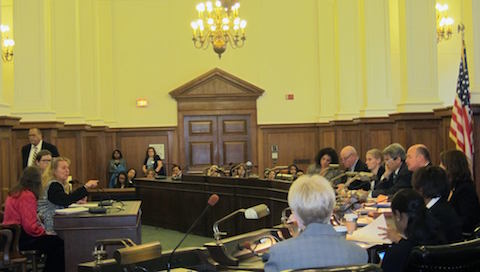For the Senate Labor Committee:
Please see the New Jersey Women and the Wage Gap fact sheet, which shows:
- Women in New Jersey are paid 80 cents for every dollar paid to men,
- The data show that this gender wage gap is present across industry, occupation and even education level,
- More than 441,000 family households in New Jersey are headed by women and approximately a quarter of these households live below the poverty level.
Being one of four sisters who were all teachers and nurses—traditionally thought of as “women’s work” —we all knew we would never be rich and famous, but we all found great satisfaction in helping others. I remember clearly the bad old days when men in the district would be moved into athletics coaching and extracurricular activities that offer stipends and more likely to be hired into district administration with higher salaries with the explicit explanation of: “They have a family to support.”
We know by the numbers that this justification is false and used only to prop up an unjust system that rewards men doing the same work with something like a 25% premium. They earn that extra money by simply not being female—a feat they accomplished with very little effort. It did not require education, study or practice on their parts. They were simple born into it. We see clearly that the data show the wrongheadedness expressed by: “They have a family to support” bonuses for men with no corresponding consideration for women who are often single providers for households with dependent children.
We need to be armed with information to fight against this unfairness and this is one thing this legislation will provide. Further, we need to remove the time barriers to justice and this legislation addresses that. The gender wage gap is not new—neither is it getting significantly better and we need to address it now. We also need to keep an eye out for women—like Lilly Ledbetter—who suffered from wage discrimination for decades and correct these longstanding injustices on an individual as well as collective basis. Lilly Ledbetter found out she was being paid less than her male counterparts for nearly two decades when she was a supervisor at a Goodyear Tire and Rubber plant. And then she made the decision to fight back.
This legislation would help Lilly Ledbetter’s in New Jersey who have been discriminated against for longer than we want to think about. We need to pass this legislation and it deserves bi-partisan support and a signature from the Governor.
My sisters and I might have earned more if we were brothers instead of sisters, but this legislation is about our daughters, our nieces and our granddaughters—the next generations of Lilly Ledbetters who want to make a significant contribution to our society. They deserve the consideration that they may be equally responsible (sometimes more so) for “taking care of their families” as their male counterparts if they so choose. Whether taking care of families or making their own way in the world, they deserve the dignity and respect of fair wages and this legislation could be another tool to help them along the way.




